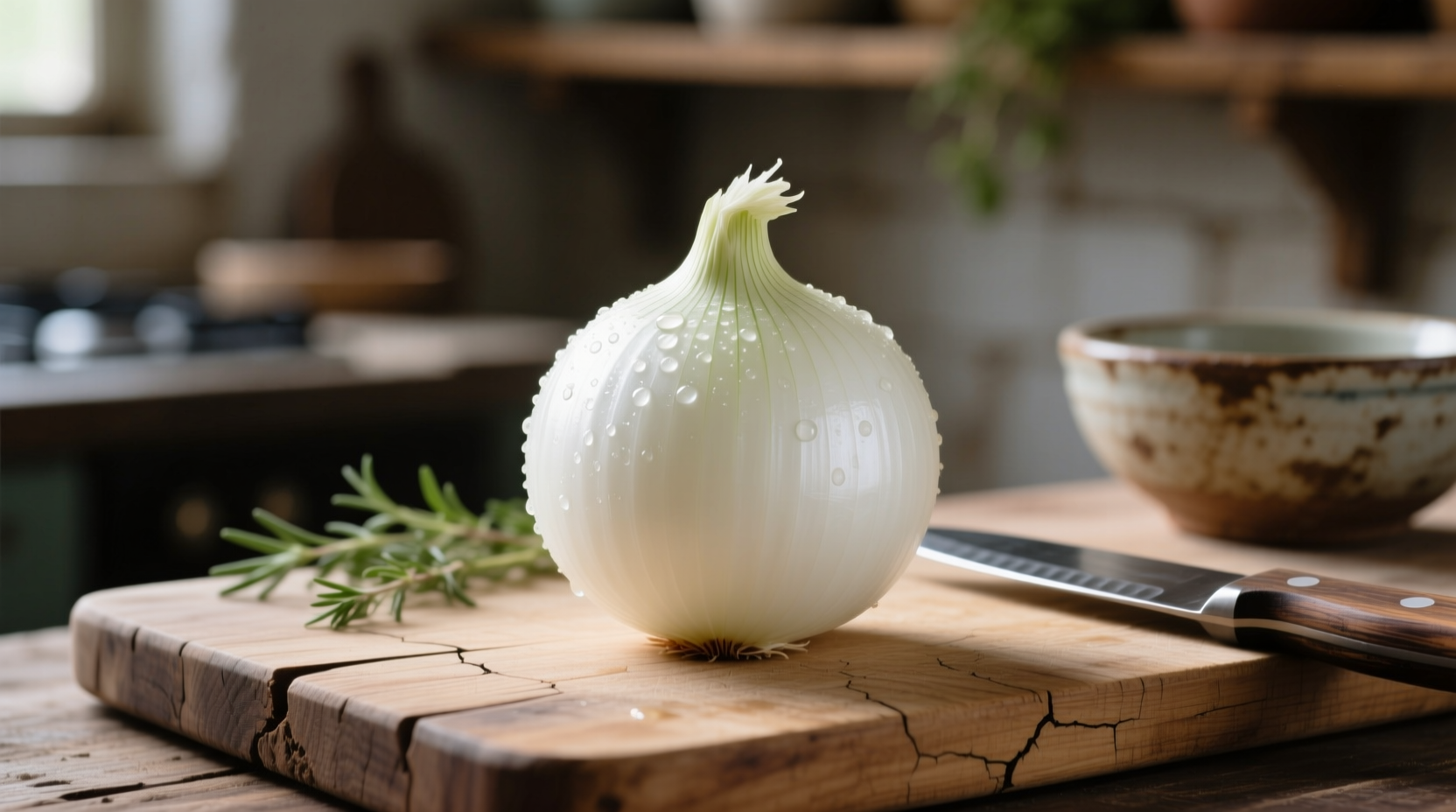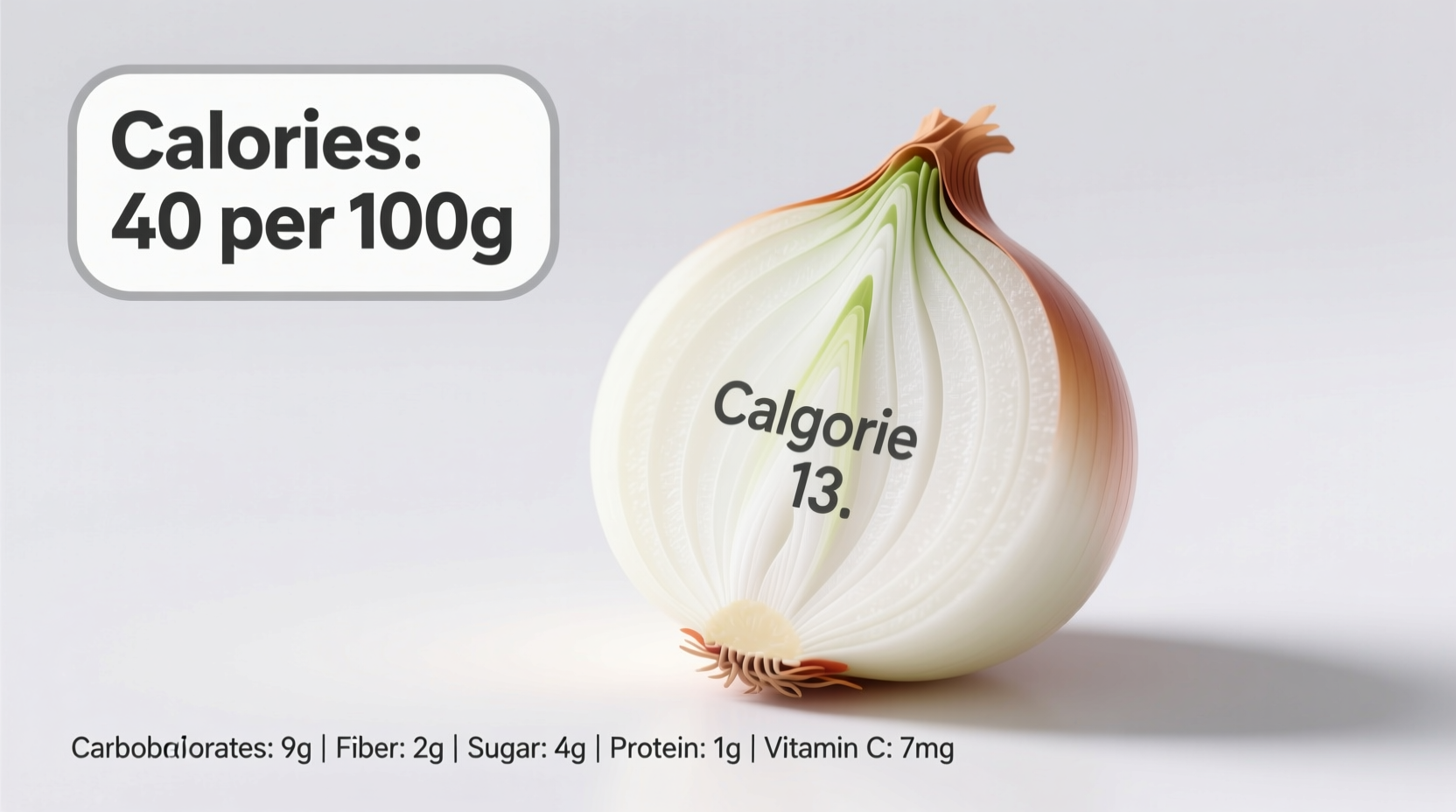Understanding the precise nutritional value of white onions helps home cooks and health-conscious eaters make informed decisions in the kitchen. Whether you're meal prepping, following a specific diet plan, or simply curious about this kitchen staple, knowing exactly what's in a serving of white onion can transform how you incorporate this versatile ingredient into your meals.
Nutritional Profile of White Onions: What the Numbers Mean
White onions provide a flavorful yet low-calorie option for enhancing dishes without significantly impacting your daily intake. According to the USDA FoodData Central database, the nutritional composition per 100 grams of raw white onion includes:
| Nutrient | Amount per 100g | % Daily Value* |
|---|---|---|
| Calories | 43 kcal | 2% |
| Total Carbohydrate | 10.2 g | 4% |
| Dietary Fiber | 1.8 g | 6% |
| Sugars | 4.2 g | - |
| Protein | 1.1 g | 2% |
| Vitamin C | 7.4 mg | 8% |
| Folate (B9) | 19 μg | 5% |
*Percent Daily Values are based on a 2,000 calorie diet. Your daily values may be higher or lower depending on your calorie needs.
When considering practical serving sizes, a medium white onion (approximately 148g) contains about 64 calories, 15.1g of carbohydrates, and 2.7g of dietary fiber. This makes white onions an excellent choice for those monitoring carbohydrate intake while still wanting flavorful ingredients in their cooking.
White Onion vs Other Varieties: Calorie Comparison
While all onion varieties share similar nutritional profiles, subtle differences exist between white, yellow, and red onions. The USDA's National Nutrient Database provides verified data showing how these common varieties compare:
| Onion Type | Calories per 100g | Carbohydrates per 100g | Sugar Content | Best Culinary Uses |
|---|---|---|---|---|
| White Onion | 43 | 10.2g | 4.2g | Salsas, salads, Mexican cuisine |
| Yellow Onion | 40 | 9.3g | 4.7g | Caramelizing, roasting, general cooking |
| Red Onion | 40 | 9.3g | 4.2g | Salads, grilling, pickling |
| Green Onions | 32 | 7.3g | 2.7g | Garnishes, Asian cuisine, raw applications |
As shown in the comparison, white onions contain slightly more calories and carbohydrates than yellow or red varieties, but the difference is minimal in practical cooking applications. The primary distinction lies in flavor profile rather than significant nutritional variation. White onions offer a sharper, more pungent flavor that mellows when cooked, making them particularly valuable in Latin American and Mediterranean cuisines.
Practical Calorie Management with White Onions
Understanding how white onions contribute to your daily intake helps maximize their culinary potential while maintaining dietary goals. Here's how white onions translate to real-world cooking scenarios:
- Salad applications: A quarter cup of diced white onion (about 40g) adds only 17 calories to your salad while providing significant flavor enhancement
- Salsa preparation: A standard restaurant-style salsa recipe using one medium white onion contributes approximately 16 calories per ¼ cup serving
- Cooking applications: When sautéed with other vegetables, a half white onion (about 74g) adds roughly 32 calories to the entire dish, which typically serves 4-6 people
- Raw consumption: In applications like pico de gallo or fresh salsas, white onions provide intense flavor with minimal caloric impact compared to adding fats or sugars
Professional chefs often leverage white onions' strong flavor profile to reduce the need for higher-calorie ingredients. By building flavor foundations with white onions rather than fats, you can create satisfying dishes with fewer calories. This technique works particularly well in soups, stews, and braises where the onion's natural sugars caramelize to create depth of flavor.

How Cooking Methods Affect White Onion Nutrition
The preparation method significantly impacts the nutritional profile of white onions. While raw white onions maintain their full vitamin content, cooking affects certain nutrients differently:
- Raw consumption: Preserves maximum vitamin C and other heat-sensitive nutrients but delivers the strongest flavor and potential digestive effects
- Sautéing: Reduces volume by about 50% through water loss, concentrating calories per volume but making onions more digestible
- Caramelizing: Breaks down complex carbohydrates into simpler sugars, slightly increasing the glycemic index but creating rich flavor compounds
- Boiling: Causes some water-soluble nutrients to leach into cooking liquid, but maintains most caloric content
For those monitoring carbohydrate intake specifically, it's important to note that cooking doesn't significantly change the total carbohydrate content, though it does affect how those carbohydrates are processed by the body. The fiber content remains relatively stable across cooking methods, providing consistent digestive benefits.
White Onions in Specialized Diets
White onions fit well within various dietary approaches when properly accounted for in meal planning:
- Keto diets: With approximately 7g net carbs per medium onion, white onions can be used sparingly in keto cooking, particularly when balanced with higher fat ingredients
- Diabetes management: The moderate glycemic load (about 5 for a medium onion) makes white onions suitable for blood sugar management when consumed as part of balanced meals
- Weight loss plans: At just 43 calories per 100g, white onions add volume and flavor to dishes without significant caloric impact, helping create satisfying low-calorie meals
- Intermittent fasting: White onions contain minimal calories that won't disrupt fasting windows when used in small quantities for flavor
The National Institutes of Health recognizes onions as part of the Allium family, which contains compounds associated with various health benefits. While not a significant source of any single nutrient, white onions contribute to overall dietary diversity, which the Dietary Guidelines for Americans emphasizes as important for long-term health.
Maximizing Flavor While Managing Calories
Professional chefs use several techniques to get the most flavor from white onions without adding unnecessary calories:
- Proper storage: Keep white onions in a cool, dry place to maintain their crispness and flavor intensity, which means you need less to achieve the desired taste
- Cutting techniques: Finely mincing increases surface area, distributing flavor more evenly throughout dishes and reducing the quantity needed
- Layering flavors: Combine white onions with aromatic herbs like cilantro or parsley to create complex flavor profiles using smaller onion quantities
- Temperature control: Cooking onions slowly over medium heat develops natural sweetness without needing added sugars
- Acid balance: A splash of lime or vinegar can enhance white onion flavor, allowing you to use less while maintaining the desired taste profile
These professional techniques help home cooks create restaurant-quality dishes with precise control over both flavor and nutritional content. By understanding exactly how many calories come from white onions in your recipes, you can make informed adjustments to meet your dietary goals without sacrificing taste.
Frequently Asked Questions
How many calories are in a small white onion?
A small white onion (approximately 80g) contains about 34 calories, with 8.2g of carbohydrates and 1.4g of dietary fiber. This makes small white onions a convenient single-serving option for recipes requiring moderate onion flavor without excessive calories.
Are white onions lower in calories than yellow onions?
White onions contain slightly more calories than yellow onions (43 vs 40 calories per 100g), but the difference is negligible in practical cooking applications. The primary distinction is flavor profile rather than significant nutritional variation, with white onions offering a sharper taste that mellows when cooked.
Do white onions have carbohydrates that affect blood sugar?
Yes, white onions contain carbohydrates (10.2g per 100g), but they have a low glycemic load of approximately 2 per 100g. The fiber content (1.8g per 100g) helps moderate blood sugar response, making white onions suitable for most blood sugar management plans when consumed in typical culinary amounts.
How does the calorie content change when white onions are cooked?
Cooking concentrates white onions' calories by reducing water content. While the total calories remain the same, cooked white onions have higher calories per volume. For example, 100g of raw white onion (43 calories) reduces to about 50g when caramelized, effectively doubling the calories per volume to approximately 86 calories per 100g of cooked product.
Can white onions help with weight loss despite containing calories?
Yes, white onions can support weight loss efforts. At just 43 calories per 100g, they add significant flavor and volume to dishes with minimal caloric impact. Their fiber content promotes satiety, and their strong flavor allows for reducing higher-calorie ingredients like fats and sugars in recipes while maintaining satisfying taste profiles.











 浙公网安备
33010002000092号
浙公网安备
33010002000092号 浙B2-20120091-4
浙B2-20120091-4